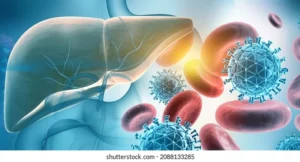
shutterstock.com
What Is Viral Hepatitis
Hepatitis is a general term used to describe the liver’s inflammation. Hepatitis is a liver inflammation caused by an infectious virus and noninfectious agent. It leads to a range of health problems which can be fatal. The liver is a vital organ that processes nutrients, filters the blood, and fights against infection. If the liver is damaged or inflamed then its functions can be affected. Heavy alcohol, toxin, medication and some medical condition can affect the liver and leads to hepatitis.
However, Viral infection is the common cause of hepatitis but there are other possible causes of hepatitis. These include autoimmune hepatitis that occurs from the consumption of medication, drugs, toxins and alcohol. Autoimmune hepatitis occurs when the human body makes antibodies against liver tissue.
Categories Of Hepatitis
There are five strains of virus which are referred to as types Hepatitis A, Hepatitis B, Hepatitis C, Hepatitis D, and Hepatitis E.
Hepatitis A
This type of hepatitis is acute and short-term. and vaccine-preventable. Hepatitis A is found in the stool or blood of people. It is a contagious disease. Hepatitis A is usually transmitted through the faecal-oral route. A person can get infected with hepatitis A through faecal if he does not wash his hands properly after using the washroom. After that, it can spread from person to person. The incubation period of this virus is 2 to 6 weeks. Has been estimated by the Center for disease control and prevention in the united states every year approx 6700 hepatitis A cases are found.

gloveclinic.com
Symptoms:
- Jaundice
- Abdominal Pain
- Nausea
- Low Appetite
Symptoms of hepatitis A can last up to 2 months.
Hepatitis B
Hepatitis B is caused by the hepatitis B virus and it is an ongoing chronic infection. It is a vaccine-preventable liver infection. Hepatitis B is transmitted from the blood, semen or body fluids of a person who is infected with hepatitis B. Hepatitis B can also spread through a sexual relationship, syringe, needles, or other medical equipment, as well as a baby, can get infected through his mother at the time of birth. For some people, it is a short-term illness but for some people is an ongoing chronic infection and can lead to serious health issues even life-threatening like liver cancer.

ailbsindia.com
There are two types of Hepatitis B:
Acute infection:
When a person is first infected with this hepatitis B virus then it is referred to as acute infection. Symptoms range from no symptoms to liver failure. Usually, adults get over it and don’t have a lot of problems.
Chronic infection:
Chronic infection occurs when the hepatitis virus remains in the blood for more than 6 months. Although most adults do not develop chronic hepatitis B, infants and young children are less able to remove the virus from their bodies and may develop chronic hepatitis B as a result.
Symptoms:
- Fatigue
- Poor Appetite
- Nausea
- Chest pain
- Jaundice
Hepatitis C:
Hepatitis C is a blood-borne viral disease and is usually transmitted through sharing needles and other drug-related equipment. Many people who are infected with the Hepatitis C virus don’t have any symptoms. Most people are living with the virus unaware that they have the virus. About 80% of people who are suffering from the disease get a long-term infection. When symptoms appear they often have a sign of advanced liver disease. It can sometimes cirrhosis, a scarring of the liver. It can be short-term but 85 % of people develop a chronic and long-term infection.

bestpractice.bmj.com
There is no vaccine for Hepatitis C. The best way to prevent hepatitis C is to avoid behaviours which can spread the disease.
Symptoms:
Hepatitis C has three stages and each stage has different symptoms:
Prodromal Phase: Early phase of the disease is called the Prodromal phase. Symptoms are:
- Fever
- Arthritis
- Rash
- Oedema (Swelling)
Preicteric Phase: Symptoms of the next phase are the Preicteric phase.
- Fatigue
- Myalgia
- Anorexia
- Nausea
- Fever
- Cough
- Abdominal Pain
- Diarrhoea
- Dark urine & light stool colour
Icteric Phase: Symptoms of the icteric phase are:
- Jaundice
- Other symptoms may subside
- Anorexia, Vomiting & Nausea
- Irritated skin lesions may develop
Hepatitis D
It is also known as “Delta hepatitis”. Hepatitis D occurs in those people who are already infected with Hepatitis B. When blood or body fluids from an infected person transmit the virus who is not infected. It is acute or short-term and can be a long-term or chronic infection. People can infect with both viruses Hepatitis B and Hepatitis D at the same time and this is known as coinfection. If a person gets infected with Hepatitis D after getting an infection with hepatitis B is known as superinfection. There is no vaccine available for hepatitis D.

sciencedirect.com
Hepatitis E
Hepatitis E is a waterborne disease, It is a liver infection caused y the hepatitis E virus. It is also found in the stool of an infected person. It can spread when someone ingests a microscopic amount of this virus if he does not wash his hands properly after using the washroom. Hepatitis E can also transmit through raw or uncooked pork, version, wild boar meat or shellfish. Currently, there is no vaccine for hepatitis E.

medicalnewstoday.com
Symptoms:
- Nausea
- Appetite
- fatigue
- Jaundice
- Stomach Pain
Disclaimer: All the content of this article is for information purposes only.
References:

 Myocardial Infarction- Symptoms, Causes & Treatment
Myocardial Infarction- Symptoms, Causes & Treatment Malaria: Causes, Symptoms & Diagnosis
Malaria: Causes, Symptoms & Diagnosis Prostate Cancer: Causes, Symptoms & Treatment
Prostate Cancer: Causes, Symptoms & Treatment Heart Attack: Symptoms & Risk Factors
Heart Attack: Symptoms & Risk Factors


